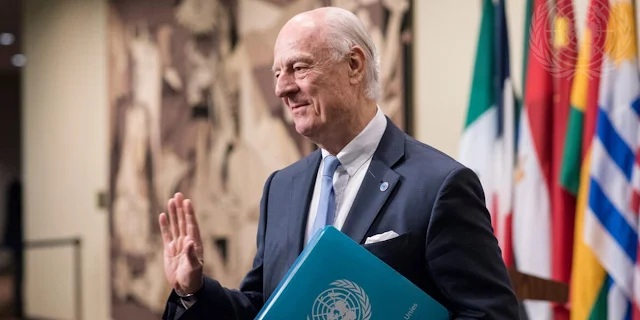Western Sahara Between Stalemate and Change: An Analysis of De Mistura’s Report to the UN Security Council
April 16, 2025 — Staffan de Mistura, the UN Secretary-General’s Personal Envoy for Western Sahara, delivered a rare and substantial briefing before the Security Council. His report comes at a critical juncture, marked by significant bilateral diplomatic movements, yet overshadowed by a fifty-year-old political deadlock. With a tone both measured and resolute, De Mistura outlines a situation mired in stagnation, yet fraught with potential triggers—some promising hope, others bearing risk.
Bilateral Dynamics Shrouded in Ambiguity
The report opens by highlighting two key bilateral developments: Moroccan Foreign Minister Nasser Bourita’s visit to Washington on April 8, and his French counterpart Stéphane Barrot’s visit to Algiers two days earlier. Although the Western Sahara issue was not officially on the agenda, the visits reflect renewed attention from two permanent members of the Security Council—namely the United States and France—to regional stability.
Of particular note is the U.S. message conveyed by Secretary of State Rubio. While reaffirming the Trump administration’s 2020 declaration recognizing Moroccan sovereignty over Western Sahara, the U.S. simultaneously underscores the need for a “mutually acceptable solution” and “genuine autonomy,” suggesting a delicate balancing act between support for Rabat and the imperative of negotiation.
Regional Tensions: Between Paralysis and Escalation
De Mistura rightly reminds us that these diplomatic maneuvers unfold in a deeply deteriorated regional context. Diplomatic relations between Algeria and Morocco remain severed, borders are closed, and military spending is on the rise. This escalating tension renders any political progress exceedingly fragile, as the Western Sahara conflict has, over decades, become a central point of contention between two regional powers whose divergences increasingly revolve around this issue.
The American Triptych: Autonomy, Negotiation, and Engagement
De Mistura identifies three core messages in the current U.S. position:
-
“Genuine” Autonomy: The UN envoy calls for substantive clarification of the Moroccan autonomy proposal. What powers would truly be devolved? How far would local self-governance extend? These remain unanswered questions.
-
A Mutually Acceptable Solution: This widely used diplomatic phrase presupposes genuine negotiation. De Mistura emphasizes the need to incorporate, at the appropriate moment, a “credible form of self-determination.”
-
More Direct U.S. Engagement: Washington’s expressed readiness is seen by the envoy as an opportunity—provided it remains within the UN framework and under the Security Council’s oversight.
Listening to Stakeholders: Between Repetition and Frustration
De Mistura’s regional visits—to Rabat, Nouakchott, Tindouf, and Algiers—have yielded no major breakthroughs. Positions remain entrenched, narratives familiar. Nonetheless, Mauritania maintains its “positive neutrality,” offering to support any constructive progress.
But it was in the refugee camps of Tindouf that the UN envoy seemed most deeply moved. Amid a worsening humanitarian crisis—with food rations at risk of being halted this summer due to funding shortages—De Mistura relays the voices of the most vulnerable: young Sahrawis born and raised in exile, nurtured on unfulfilled hopes. One young woman told him she did not wish to die before seeing her homeland—an intimate testimony to a people’s prolonged despair.
The Marginal Presence of Women
In a poignant section of his speech, De Mistura underlined the urgent need for full and effective participation of Sahrawi women in the resolution process. This is essential not only for ensuring a sustainable peace but also for reinforcing the legitimacy of a process still seen by many as dominated by state and military actors.
A Narrow but Genuine Window of Opportunity
The year 2025 marks fifty years since the Western Sahara issue was first placed on the UN agenda. Fifty years of waiting, of unimplemented resolutions, of suspended negotiations. Yet De Mistura remains hopeful. He sees the next three months as potentially decisive—if permanent Security Council members can muster the political will.
The October 2025 Security Council session could be a turning point. Until then, the Special Envoy continues his mission with a clear conviction: no viable solution is possible without regional de-escalation, sincere commitment from all parties, and steady international support.
Forward-Looking Conclusion: A Deep-Rooted Geopolitical Equation
An analysis of De Mistura’s report reveals that, beneath the surface of apparent inertia, the Western Sahara remains one of the most volatile issues in international affairs. Its future hinges on the ability of regional and global actors to move beyond entrenched positions and commit to a genuine, lawful compromise.
No lasting resolution can emerge without securing the Sahrawi people’s inalienable right to self-determination—as recognized by the UN Charter and numerous UN resolutions.
In this light, Algeria—a central regional actor—will not relinquish its support for the Sahrawi cause. This stance is not only rooted in its commitment to a legitimate decolonization process, but also in its perception of Moroccan attempts to impose a fait accompli in Western Sahara as a direct threat to regional stability. The issue is not one of imbalance in military capabilities—Algeria possesses a modern, well-organized, and technologically advanced army compared to its western neighbor—but of strategic vigilance in the face of Morocco’s historical expansionist ambitions.
Accepting such dynamics would, for Algiers, amount to legitimizing a blatant breach of international law and compromising the very foundations of the regional order. Algeria, therefore, cannot yield on a matter that touches its founding diplomatic principles, strategic depth, and national security.
Thus, the coming months must serve as a moment for the international community—especially the permanent members of the Security Council—to abandon ambiguity and fully assume their responsibilities. The only path to a just and lasting peace lies in organizing a credible process of self-determination for the Sahrawi people, under UN supervision, and in strict accordance with relevant resolutions.
Otherwise, any initiative—however well-intentioned—will prove futile, and Sahrawi youth will continue to see their future held hostage in exile and uncertainty. But should this fundamental right finally be recognized and fulfilled, a new era of regional cooperation could dawn, benefiting all peoples of the Maghreb.
By: Belgacem Merbah




Comments
Post a Comment